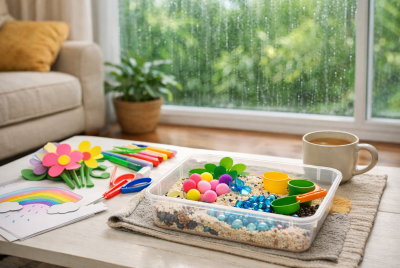Mindful Parenting: Techniques to Foster Presence and Connection with Your Child
We may earn a commission for purchases made using our links. Please see our disclosure to learn more.
For families hoping to forge closer, more wholesome bonds, mindful parenting is more than simply a catchphrase. You’re not alone if you’ve ever experienced distraction, overwhelm, or a pattern of reacting rather than responding to your child. Although modern life diverts our attention in all directions, many parents wish to be more connected and present. The good news? You may end this pattern, improve peace in your house, and build enduring relationships with your child by using mindful parenting strategies.
Why Mindful Parenting Matters
In the modern world, being a parent might feel like juggling a dozen things at once. It is easy to fall into autopilot mode when faced with a never-ending to-do list, buzzing electronics, and mounting duties. Being a mindful parent allows you to escape this hurry. It involves focusing entirely on the here and now and interacting with your child on their level. The outcome? Less power struggles, more meaningful moments, and a basis of mutual respect and trust.
What Is Mindful Parenting?
Being physically, cognitively, and emotionally present with your child is the foundation of mindful parenting. It entails paying attention to your feelings and thoughts, listening objectively, and responding purposefully as opposed to reflexively. In order to provide a peaceful, encouraging environment where everyone may flourish, mindful parents pay attention to their children’s needs and feelings.
Mindful parenting isn’t about chasing perfection. It’s about walking a journey of growth and discovery alongside your child, embracing mistakes as they come, and nurturing compassion for both yourself and your little one.

Why Mindful Parenting Matters
Both you and your child can experience meaningful benefits when you practice mindful parenting. Here’s what you can expect as you integrate these techniques into your daily life:
- Stronger Parent-Child Connection: When you’re fully present, your child feels truly seen and heard.
- Emotional Regulation: Mindfulness helps you stay calm, even during meltdowns or challenging moments.
- Improved Communication: Mindful listening leads to fewer misunderstandings and more effective problem-solving.
- Less Stress: Presence reduces anxiety and creates a more peaceful home environment.
- Positive Behavior Changes: Kids who feel understood and valued tend to cooperate more and act out less.
Core Techniques for Mindful Parenting
Ready to make mindful parenting part of your daily routine? These practical techniques can help you foster presence and connection with your child, no matter their age.
Embrace Active Listening
Truly listening is at the heart of mindful parenting. Set aside distractions, maintain eye contact, and give your child your full attention as they speak—without interrupting or rushing to fix things. Reflect back what they’ve shared, such as saying, “It sounds like you felt left out at recess today.” This thoughtful approach lets your child know their feelings are important and heard.
Respond, Don’t React
It’s tempting to react instantly when your child misbehaves or pushes your buttons. Instead, pause and take a breath. Notice what you’re feeling, and choose your response intentionally. For example, if your child is having a tantrum, resist the urge to yell. Acknowledge their emotions and set boundaries calmly: “I see you’re upset. Let’s take a break and talk when you’re ready.”
Lead by Example with Mindfulness
Kids naturally imitate what they see. When you demonstrate mindfulness—pausing to breathe deeply, taking things slowly, and truly being present—your child is likely to follow your lead. Weave brief mindfulness moments into your daily routine, such as a gentle stretch in the morning, a few calming breaths before a meal, or sharing gratitude together at bedtime. These small habits can help set a calm, positive atmosphere for everyone.
Create Rituals of Connection
Rituals help anchor your family in presence and togetherness. These can be as simple as a nightly bedtime story, a weekend nature walk, or a family gratitude jar. Consistent rituals create a sense of security and belonging that helps children feel safe and loved.
Use Mindful Language
The words you choose shape your child’s inner world. Use language that encourages curiosity, empathy, and reflection. Instead of “You’re being bad,” try “I notice you’re having a hard time sharing today. How can we work through this together?” This approach invites problem-solving and helps your child develop emotional intelligence.
Scientific Evidence: How Mindful Parenting Impacts Families
Wondering if mindful parenting truly makes a difference? The answer is yes—and there’s real science to back it up. Over the past decade, researchers have examined the effects of mindful parenting on both parents and children. Here are two standout studies that shed light on why these techniques are so powerful:
Systematic Review Finds Moderate Gains in Mindful Parenting
A 2021 systematic review of mindful parenting interventions looked at data from more than 1,300 parents across 11 different studies. The review found that parents who practiced mindfulness techniques showed a moderate increase in their ability to parent mindfully (SMD = 0.62). While changes in parenting stress and children’s behavior were mixed, the improvement in present-moment awareness and calmer responses was clear. These findings highlight that mindful parenting can help you become more attuned, focused, and patient with your child—especially when practiced consistently.
Meta-Analysis: Mindfulness Reduces Parenting Stress
Another compelling piece of research is the 2019 meta-analysis of mindfulness interventions for parents. By pooling results from 25 studies (including several randomized controlled trials), researchers discovered that mindfulness programs led to a small-to-moderate reduction in parenting stress. Parents who participated also reported small improvements in their children’s emotional and behavioral well-being. Most importantly, mindful parenting programs were shown to outperform traditional parenting approaches when it comes to managing stress, which is key for building a peaceful and connected home.
In summary: If you’re searching for an evidence-based approach to improve your family life, both of these comprehensive reviews confirm that mindful parenting delivers real, measurable benefits for both parents and children. Even small shifts toward mindfulness can ripple out into more connected, resilient relationships at home.
Overcoming Common Mindful Parenting Challenges
Even the most committed parents run into obstacles. Maybe you feel too busy, your child resists mindfulness activities, or you struggle to keep your own emotions in check—especially during times of added family stress, like parents arguing over finances. Here are a few tips for staying on track:
- Start Small: Choose one technique to practice daily. Consistency matters more than perfection.
- Embrace Imperfection: Everyone slips up—what counts is coming back to presence, again and again.
- Get Support: Talk with other parents, join a parenting group, or consider working with a therapist familiar with mindfulness.
- Make It Fun: Use games, music, or creative activities to introduce mindfulness to younger kids.
Keep in mind, mindful parenting is an ongoing journey rather than a final goal. Allow yourself patience and kindness as you continue to learn and evolve along the way.

Practical Tools & Recommended Products for Mindful Families
Having the right tools can make it easier to weave mindfulness into daily life. Here are a few highly rated products on Amazon that can help you create a more mindful, connected family environment:
- Mindful Kids: 50 Mindfulness Activities for Kindness, Focus and Calm – A deck of activity cards that guide kids through breathing, stretching, and reflection exercises.
- Breathe Like a Bear: 30 Mindful Moments for Kids to Feel Calm and Focused Anytime, Anywhere – This charmingly illustrated book features simple, child-friendly mindfulness exercises designed to help kids relax and refocus throughout the day.
- Breathing Buddha: Mindfulness Meditation Tool for Kids – An engaging, light-up breathing companion that teaches children calming breathing techniques through guided lights and colors.
- Guided Mindfulness Journal for Kids – A journal that encourages kids to express their thoughts, feelings, and gratitude.
- Family Conversation Cards – Fun prompts that foster deeper family connections during meals or quiet time.
Conclusion: Small Steps, Big Changes
Mindful parenting isn’t about being the “perfect” parent or having all the answers. It’s about showing up, being present, and growing together as a family. Even small changes—like listening more closely, taking a breath before responding, or starting a new family ritual—can make a world of difference over time. When you embrace mindful parenting, you foster a home where your child feels appreciated, heard, and truly bonded with you. Begin now, and notice how your relationship grows stronger each day.
Frequently Asked Questions (FAQ)
1. What is the focus of mindful parenting?
Mindful parenting centers on being present, attentive, and non-judgmental with your child. It’s about listening deeply, regulating your own emotions, and creating a space where your child feels seen and supported.
2. Can I practice mindful parenting if I’m always busy?
Absolutely! Mindful parenting isn’t about adding more tasks to your plate. It’s about shifting your focus to be more present in the moments you already share with your child, even if they’re brief.
3. How can I help my child start practicing mindfulness?
Start with simple practices like deep breathing, gratitude, or short mindful walks. Using books and activity cards designed for kids can make mindfulness fun and accessible for all ages.
4. What if my child resists mindfulness activities?
Keep it playful and pressure-free. Offer different options—art, movement, storytelling—and let your child choose what feels comfortable. Modeling mindfulness yourself is often the best teacher.
5. Are there any tools to help with mindful parenting?
Yes, there are many! Guided journals, mindfulness activity cards, family conversation prompts, and even mindfulness apps can support your journey.




